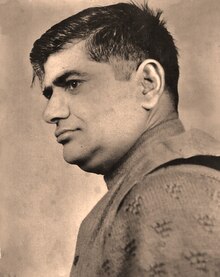Mani Ram Bagri | |
|---|---|
 | |
| Member of Legislative Assembly | |
| Constituency | Fatehabad, Haryana |
| Member of Parliament 3rd Lok Sabha | |
| Constituency | Hisar, Haryana |
| Member of Parliament 6th Lok Sabha | |
| Constituency | Mathura, Uttar Pradesh |
| Member of Parliament 7th Lok Sabha | |
| Constituency | Hisar, Haryana |
| Personal details | |
| Born | 1 January 1920 Ban Mandori, Hisar, Punjab, British India |
| Died | 31 January 2012 (aged 92) Hisar, Haryana |
| Nationality | |
| Spouse | Dhani Devi |
| Children | 5 |
| Residence(s) | Bagri Chowk, Hisar, Haryana |
| Profession | Activist, Politician |
Ch. Mani Ram Bagri (1 January 1920 – 31 January 2012) was an Indian parliamentarian and political activist. He served three terms in the Indian Parliament, first from 1962 to 1967, and then again from 1977 to 1984 [Consisting of two terms: 1977-1980 and 1980-1984]. He belonged to the league of parliamentary opposition socialists like Dr. Ram Manohar Lohia and Jayaprakash Narayan.[1]
Known widely throughout North India during his tenure as the "de facto" Leader of Opposition in the Lok Sabha, Bagri was widely considered to be one of the most prolific Socialist leaders of his time. He was party to the nation's international visits to the USSR, including the summit that led to the Tashkent Declaration, as well as the Warsaw Pact socialist republics in the 1960s. He is also notable for being the first speaker to address the International Parliamentary Conference in Hindi, his mother tongue.
- ^ "tribuneindia... Regional Vignettes". Tribuneindia.com. Retrieved 9 February 2012.